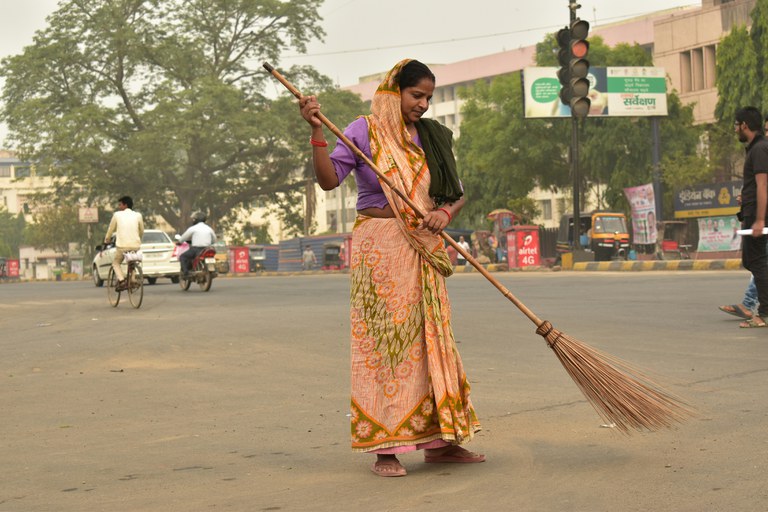This blog was written by one of the students who joined the WageIndicator Gig team during their Internship Programme. The internship also allows the interns to contribute to the news collection and create visuals to give an overview of different platform economy topics.

Cristina Ciocanu - Bucharest University of Economic Studies Romania Interns
The rise of India’s 15-minute business model - from Zomato’s introduction to fast food delivery to Amazon’s entry into rapid grocery services - has now expanded to domestic work, like Urban Company’s Insta Maids, now Insta Help.
Claiming to offer housework help in just 15 minutes, this new concept has sparked an intense debate about the exploitation of labour rights and an overall disregard for sustainable practices within the gig economy.
This blog explores how these ultra-fast services are affecting gig workers’ rights and safety and how the workers’ unions and groups are starting to respond to these negative shifts in the gig economy.
What is new in Insta Help?
The idea of delivering services in as little as 15 minutes to maximise profits and be competitive is typical of the gig economy.
However, now India’s obsession with speed has officially moved beyond food and groceries. It began with platforms like Zomato, which has recently entered the quick-commerce race, launching a 15-minute food delivery tab on the app, offering customers near-instant meals. Amazon followed shortly by rolling out trials of 15-minute grocery delivery, hoping to compete with the likes of Zepto and Swiggy Instamart in India’s ultrafast commerce rush.
But the idea wasn't limited to consumer goods. In March 2025, Urban Company took the plunge and launched Insta Maids, then rebranded as Insta Help, a 15-minute maid service offering all kinds of domestic help, from sweeping and mopping to basic tidying - whatever you need, delivered to your doorstep in record time. This was a radical departure: the gig economy's appetite for speed was no longer limited to products, but now extended to human labour and physical services.
The expansion of the 15-minute model speaks to how it has fundamentally reshaped the landscape of consumer expectations around immediate needs. But it also raises serious concerns about the feasibility, fairness and price of convenience - at least for the workers who are expected to meet these tight deadlines.
| Did you know? Due to unfair treatment, female gig workers often turn to women-only platforms. |
What’s the debate about? Labour rights under pressure
As the 15-minute model expands from food and groceries to services like Urban Company’s InstaMaid, more and more people are starting to ask: who is really paying the price for this speed?
Insta Help brings a maid to your doorstep in 15 minutes, but the service, which charges ₹49 per hour, has been criticised by campaigners as “modern day slavery” pointing to how little workers are paid for the amount of pressure they face. On platforms such as X, users have also voiced concerns about unrealistic time demands and the emotional and physical toll the work can take.
These concerns are confirmed in a 2025 study by Zaker Ul Oman, Kanak Bhati, and Anas Ahmed published in the World Journal of Advanced Research and Reviews, which found that although gig work is assumed to be flexible, it often comes with low pay, no job security, and very few protections—particularly when these gig workers are classified as independent contractors, depriving them of access to benefits or fair contracts. So while customers get convenience, many workers are left bearing the burden of a system that moves faster than it protects them.
A Comparative Look: How are Amazon and Zomato Handling it?
When it comes to fast delivery, both Amazon and Zomato have jumped into the 15-minute game - but they're doing it a little differently.
Zomato was one of the first to launch a 15-minute food delivery tab on its app, targeting specific locations with hyper-local kitchens and optimised routes to make it feasible.
Amazon, on the other hand, is still testing this model, presumably using its vast logistics network and warehousing systems to compete with the likes of Blinkit and Zepto. With both betting heavily on speed, the fundamental difference between them is one of scale and infrastructure - Zomato hopes to rely on restaurant partners and gig delivery workers darting through traffic, and Amazon appears to be building a more regulated system behind the scenes.
Still, in both cases, the pressure to deliver quickly can trickle down to the workers, fuelling the ongoing debate about how sustainable or fair this model really is.

What are the worker groups and advocates talking about?
Activists and workers’ rights advocates condemned the ₹49-an-hour service as 'modern slavery', citing exploitative pay and unrealistic delivery promises. The backlash spread almost instantly online, with users on Twitter openly questioning whether we should be adopting a 15-minute service model that was sanitised for food but not designed for the treatment of human workers.
While Urban Company has previously faced criticism for the treatment of gig workers on its platform, the new service has sparked further calls for greater labour protections and transparency in platform work.
The backlash against InstaMaid highlights a growing rejection - both online and offline - of business models that prioritise speed over dignity. It is a powerful reminder that workers and activists are vigilant, organised and committed to ensuring that convenience does not come at the expense of rights.
Conclusion: Is a 15-minute delivery a race worth running?
The 15-minute delivery model may capture the attention of impatient customers, but it raises important questions about those left behind in the pursuit of speed. For platforms like Zomato, Amazon and Urban Company, the push for fast delivery often comes at the expense of gig workers, who bear the true cost of this urgency - struggling with low pay, relentless pressure and minimal protections. As convenience increasingly becomes the new standard, we must ask: is faster really better, especially when it compromises fairness and dignity?
